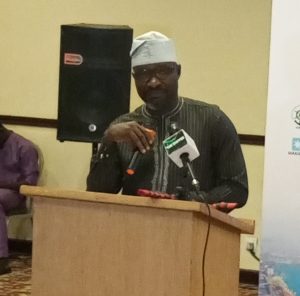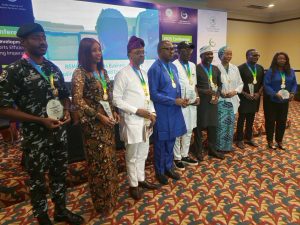NLNG shipping boss advocates for maritime training, digital reforms to compete amidst global regulations

As the tides of international maritime regulation continues to shift and tightens rapidly, Abdulkadir Ahmed of NLNG Shipping and Marine Services Limited (NSML) advocates for urgent maritime training, digital reforms to future-proof Nigeria’s shipping industry amid sweeping global regulations.
Ahmed hinted that Nigeria must rise to the occasion or risk being left behind as the tides of international maritime regulation shift rapidly to address climate change, cybersecurity, automation, and seafarer welfare.
Mr. Abdulkadir Ahmed, Managing Director of NLNG Shipping and Marine Services Limited (NSML) made these remarks while speaking in a paper titled “The Evolving Global Maritime Regulatory Environment – The Role of Maritime Training and Capacity Development” at the 2025 Annual Conference of the Association of Maritime Journalists of Nigeria (AMJON), held at Sheraton Hotel, Ikeja, Lagos.
Abdulkadir Ahmed who was represented by Mutiu Olayiwola, Manager, Finance and Corporate Services NSML, called for accelerated investment in maritime human capital as new international laws and technologies reshape global shipping.
Ahmed stated “The maritime industry is undergoing a regulatory revolution — from the IMO’s carbon rules to autonomous shipping and seafarer rights.
“If Nigeria does not urgently prioritize structured maritime training and capacity development, we risk losing relevance in global trade.”
Ahmed cited three major regulatory fronts disrupting traditional shipping practices to include:
- Environmental Compliance: IMO 2020 Sulphur Cap and Carbon Intensity Indicator (CII) demand low-emission ships.
Ballast Water Management mandates treatment systems to protect marine ecosystems.
- Cybersecurity and Automation: Digital transformation opens the industry to hacking and data breaches. The rise of autonomous vessels requires new rules and digitally fluent crew.
- Seafarer Welfare: COVID-19 exposed poor crew conditions, prompting amendments to the Maritime Labour Convention (MLC) for better rest hours, medical access, and repatriation rights.
The NSML boss affirmed that maritime training is Nigeria’s lifeline, noting that compliance alone is not enough; hence Nigeria must invest in the competencies needed to interpret and implement these new norms.
“Our future lies in the quality of our workforce. The best ships mean nothing without skilled people to operate, maintain, and manage them,” he said.
Ahmed suggested embedding digital literacy and cybersecurity awareness in training curricula; Simulation-based exercises for engine room and bridge operations as well as Knowledge of international maritime law and environmental standards.
He cited the NSML Maritime Centre of Excellence (MCOE) in Bonny, Rivers State, as a benchmark for capacity development, stressing that the MCOE is one of Africa’s first UK Maritime & Coastguard Agency-accredited facilities, approved by NIMASA and certified by DNV.
He listed key achievements to include: 200+ cadets trained under the Seafarers Cadetship Development Programme (SCDP); 85% Nigerianisation of crew across NSML-managed vessel; Full Nigerian staffing in onshore operations as well as Advanced maritime simulators offering real-time emergency and navigation training
According to him, “This eliminates the need for Nigerian seafarers to travel abroad for certification. It saves cost, boosts local talent, and strengthens national pride.”
He explained that the MCOE also features one of Africa’s most advanced simulation systems, offering real-time training in bridge operations, engine room dynamics, cargo handling, and crisis response. This, he said ensures not just compliance with international standards but also fosters confidence and competence among cadets and seasoned professionals alike.
Ahmed detailed NSML’s strategic contributions and broader industry efforts beyond training to include: Fleet Renewal: Deployment of dual-fuel LNG carriers like AXIOS II and AKTORAS
Shipbuilding Supervision: Oversight of a 23,000m³ LPG vessel build in South Korea. These include its supervision of the construction of modern LPG vessels, strategic fleet renewal using dual-fuel, energy-efficient ships.
Decarbonization Agenda: Exploring hydrogen and ammonia as alternative fuels in alignment with IMO 2030 and 2050 targets.
Security & Registry Reforms: Supporting NIMASA’s Deep Blue Project and ship registry modernization aimed at boosting maritime security.
Ahmed called on policymakers, industry leaders, and maritime institutions to adopt a long-term view by embedding training into every facet of the sector.
“Regulation is no longer static. It’s dynamic, demanding, and global. Training is our weapon. Capacity development is our shield. And partnership is our route to global relevance,” he emphasized.
He reiterated NSML’s commitment to training the next generation of maritime professionals and urged the private sector players, and the media to continue working together in building a stronger and more resilient maritime future for Nigeria and Africa at large.
He commended AMJON for its vital role in shaping public discourse and storytelling in the maritime space, stressing that the narrative of a transformed maritime industry must be driven from within.
Highpoint of the event was the presentation of award of AMJON award to NSML and others.
PHOTO NEWS

